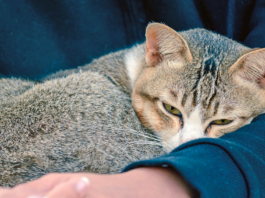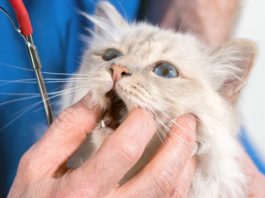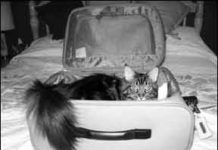In Cats, Fear and Shyness Can Look the Same
Not sure if a cat you want to adopt or even approach is fearful or simply shy? Recognizing the difference between the two behaviors can mean the start of a trusting relationship or the onslaught of an attack.A shy cat is more apt to freeze in place and tremble in hopes that you will walk away. A fearful cat will likely flatten his ears, dilate his pupils and deliver a warning hiss before swatting or biting you if you try to touch him.
In The News: October 2015
Some signs of stress in cats are obvious - loss of appetite, increased urine marking, hair loss from over grooming. Other signs may be more subtle and easy to overlook, according to a study by the Autonomous University of Barcelona.
Why Do They … Chase Lasers Beams?
Cats love to chase lasers’ points of light, twirling, leaping, pouncing. They engage in the behavior with gleeful abandon for one simple reason: “The jumpy, erratic movement of the light beam can stimulate predatory-like play behavior,” says Pamela Perry, DVM, Ph.D., a lecturer in animal behavior at the Cornell University College of Veterinary Medicine.
Why Do They Chase Lasers Beams?
Cats love to chase lasers’ points of light, twirling, leaping, pouncing. They engage in the behavior with gleeful abandon for one simple reason: “The jumpy, erratic movement of the light beam can stimulate predatory-like play behavior,” says Pamela Perry, DVM, Ph.D., a lecturer in animal behavior at the Cornell University College of Veterinary Medicine.
Ask Elizabeth: May 2013
Thank you so much for recognizing how adorable it is when we cock our heads to one side. We’re only trying to look cute when we do this … it really serves no function. I’m kidding, although I’d have to think about this, which makes me want to tilt my head to the side, too! Seriously, though, this behavior is to be distinguished from the dramatic tilting of the head that may suggest an inner ear infection (the inner ear is important for the maintenance of balance) or that may be seen when cats have ear mites or an external ear infection. Cats with abnormalities of the brain, including tumors, may also tilt their heads to one side, and any cat who demonstrates persistent head tilt and/or shaking of the head should be evaluated by a veterinarian promptly.
New Options for Separation Anxiety
Collars and diffusers that dispense calming pheromones have become popular among owners eager to ease their catsf separation anxiety. Less generally known but promising new options are supplements and specialized diets. gThe area of veterinary nutraceuticals to treat anxiety is becoming quite active,h says Katherine A. Houpt, VMD, Ph.D., former president of the American College of Veterinary Behaviorists and James Law Professor emeritus of Animal Behavior at the Cornell University College of Veterinary Medicine. gDietary supplements with ingredients like green tea, as well as flower essences like Harmonease, are also now available.h
When You Want to Adopt a Stray
Your next cat may show up when you least expect it. You glance out the window and see a skinny cat with a dirt-smudged coat looking back at you. He doesn’t rush to greet you like a lovable, lost Labrador Retriever. He sizes you up, determining if you’re friend or foe. You place bowls of food and water on the back porch to prevent him from starving or becoming dehydrated, but as the days pass and the cat moves closer to you and lets you pet him, you’re smitten. You’ve made the transition from performing an act of kindness to wanting to provide a safe, loving home.
Ask Elizabeth: February 2013
As you know, we cats are very sensitive creatures, but in your case, as with other cats with feline hypersensitivity syndrome (FHS), this sensitivity seems to be ratcheted up to varying degrees. FHS is a recognized syndrome in the feline world, although the definitive cause is not clear at this time. While it is not, in and of itself, believed to be serious with respect to its effect on overall health or longevity, a few important points regarding this unusual behavioral syndrome are worth making, especially for our human friends who are commonly puzzled by its manifestations. FHS, also variably referred to as rolling skin syndrome and atypical neurodermatitis, is characterized by dramatic twitching or rippling of the skin, most commonly on the back between the middle of the spine and the base of the tail or in the flank region, with intermittent jerking of the body and exaggerated tail movements.
Is it Normal Shedding or Hair Loss?
With the exception of hairless breeds such as the Sphynx, cats are known for their furry pelts, so if a cat starts to lose his coat, it’s justifiably cause for concern. How can you distinguish between normal shedding and abnormal hair loss? It’s easy: Shedding doesn’t cause bald spots. If the skin is visible, best to schedule a veterinarian exam or ask for a referral to a dermatologist. Hair loss, or alopecia, takes two main forms, says dermatologist William H. Miller, VMD, Medical Director of the Companion Animal Hospital at Cornell University College of Veterinary Medicine: “The hairs fall out spontaneously.” Though it’s a rare occurrence, spontaneous hair loss can be related to stress, endocrine diseases such as Cushing’s disease (an overproduction of cortisol by the adrenal glands), hyperthyroidism (excess production of the thyroid hormones), and some forms of cancer, including lymphoma, liver or pancreatic cancer.
Is Your Cat Afraid of Strange Noises?
Whenever cat owner Susan Lomond turns on her printer, her cat Sylvester dashes over to sit on it, lie on it and watch in fascination as the paper comes out. But when Susan’s friend Diana turns on her printer, her cat, Petra, flees in terror. Cats respond differently to noise depending on their personalities and experiences — and even their genetics. When cats get scared of noise, we often feel the need to soothe them. Actually, that may not be helpful. How to Help Your Cat. Cats differ from dogs when it comes to being frightened by noise. Dogs are notoriously afraid of thunder and fireworks, and will often try to escape from the house in a panic. Cats are more likely to be scared of unexpected noises around the house, such as the vacuum cleaner, construction work or a hair dryer. “But thunder and fireworks don’t seem to bother cats,” says Katherine A. Houpt, VMD, PhD, the emeritus James Law Professor of Animal Behavior at Cornell University’s College of Veterinary Medicine. “I have never seen fireworks or thunder phobia in cats,” she says.
Cats and Separation Anxiety
Vacations are wonderful, but there’s nothing like home sweet home. You drive home from the airport, excited at the thought of sleeping in your own bed, and seeing your beloved cat. And she does seem happy to see you at first, and you greet each other and cuddle several times. Then you go off to unpack …. and there she goes — right into your suitcase, urinating all over your folded clothes. To you, it may feel like your cat is angry because you left her — and this is the way she’s making her feelings known. But can a cat really hold a grudge?
Does Your Cat Need a Specialist?
Litter box aversion. Aggression. Inappropriate scratching or destructive behavior. Eating or chewing non-food materials. Cat carrier avoidance. Separation anxiety. Other fears and phobias that make you and your cat unhappy. When your cat develops a behavior problem, you may need professional advice. But whom should you call? Your veterinarian should be first on the list to rule out any medical problems. But after your cat’s clean bill of health, your veterinarian may suggest the help of a certified applied animal behaviorist or a board-certified veterinary behaviorist. While either one can help you solve your cat’s adjustment difficulty, there are some differences in the services each provides.












